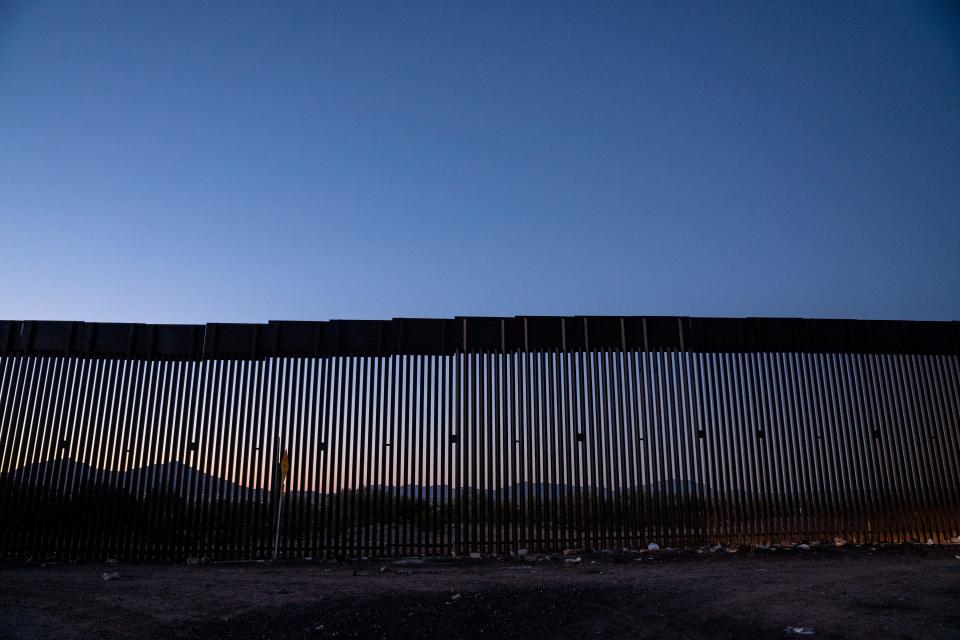Cartel 'rip crew' member appeals life sentence in border agent Brian Terry's slaying
One of seven men convicted and sentenced in the 2010 murder of U.S. Border Patrol Agent Brian Terry is appealing his conviction before a federal appeals court, citing "woefully ineffective" advice from his attorney at the time that led to his conviction.
Heraclio Osorio-Arellanes was part of a five-man "rip crew" that robbed smugglers after crossing the Arizona-Mexico border. In Dec. 14, 2010, the crew encountered a group of border agents in a canyon north of Nogales, setting off a gunfight that ended in Terry's death.
In 2020, a federal judge in Tucson sentenced Osorio-Arellanes to life in prison after a jury convicted him on nine counts, including first- and second-degree murder charges.
On Tuesday, three judges with the 9th U.S. Circuit Court of Appeals heard oral arguments from Osorio-Arellanes' new attorney, Tony Farmani. He filed an appeal in November arguing that the U.S. government illegally obtained and then submitted self-incriminating testimony from Osorio-Arellanes about Terry's murder in a February 2019 jury trial, in violation of his rights under the Fifth and Sixth Amendments of the U.S. Constitution.
After Terry's killing in 2010, Osorio-Arellanes fled to Mexico and went into hiding. In April 2017, Mexican soldiers arrested him in northern Mexico. Officials extradited him to Arizona four months later to stand trial in Terry's murder. But during the period that he was detained in Mexico pending his extradition, FBI agents conducted a post-indictment interview at a Mexican prison.
That's where, according to Farmani, Osorio-Arellanes received "woefully ineffective" advice from Juan Salvador Pimentel Ramirez, a prison attorney who showed up to the interview and met privately with Osorio-Arellanes after his extradition attorney failed to show up.

During the interview, Pimentel Ramirez erroneously encouraged Osorio-Arellanes to confess to being part of a "rip crew" that robbed drug smugglers, believing that it was not a crime and that the statements would not be used against Osorio-Arellanes, Farmani argued Tuesday.
"He had absolutely no idea, none whatsoever, about the charges," Farmani said about Pimentel Ramirez. "He had no clue about the applicable law."
It turned out that not only was Osorio-Arellanes unknowingly admitting to a crime, but attorneys for the U.S. Department of Justice later used his testimony in court during Osorio-Arellanes' trial in Tucson and relied on it in their argument to jurors to convict him for Terry's killing.
Farmani said the confession should not have been admitted in court, and is asking the 9th Circuit to reverse Osorio-Arellanes' conviction and prohibit the use of that confession if there is a new trial against him.
U.S. Attorney Ben Holley, representing the Department of Justice, argued on Tuesday that both Osorio-Arellanes and Pimentel Ramirez knew at the time of the interview about the charges against him because they had already been detailed in an indictment.
"The advice was wrong; we don't know why he gave it," Holley said. "The record is not clear about what his understanding of the law more generally was. He knew about the indictment."
Holley also argued that Pimentel Ramirez may have had a strategic reason for giving that advice, namely getting cooperation credit later on. But even he admitted that it was unusual and rare, and that most lawyers wouldn't had advised Osorio-Arellanes to talk in that scenario.
He also said there was no prejudice in this case, because Osorio-Arellanes' statements during the interview were not a full confession, and were not argued as such in court.
The three-judge panel raised questions during the arguments about whether Osorio-Arellanes was told that he could have waited until he extradited to the United States to receive a court-appointed attorney. Holley said he was read his Miranda rights.
"If it was all in the United States, it would be an easy case," U.S. Judge Andrew Hurwitz told Farmani on Tuesday, saying it would be a slam dunk. "I'm trying to figure out whether it becomes more complicated because your client chose to retain a Mexican lawyer to get advice from."
Osorio-Arellanes is one of seven men convicted and sentenced for Terry's murder. The seventh and final conviction happened in September, 12 years after Terry died.
Jesus Rosario Favela-Astorga was part of the five-man rip crew. He pleaded guilty to Terry’s murder and was sentenced to 50 years in prison in September 2022.
Manuel Osorio Arellanes, brother to Heraclio, pleaded guilty to first-degree murder and was sentenced in 2014 to 30 years in prison.
Rosario Rafael Burboa Alvarez also pleaded guilty and was sentenced in 2015 to 27 years in prison.
A jury found Ivan Soto Barraza and Jesus Lionel Sanchez-Meza guilty of first-degree murder in 2015. Both were sentenced to life in prison.
Rito Osorio Arellanes, another sibling, was not at the shooting but pleaded guilty in 2013 to conspiracy to interfere with commerce by robbery and was sentenced to eight years in prison.
This article originally appeared on Arizona Republic: Cartel rip crew member appeals life sentence in Brian Terry's slaying

